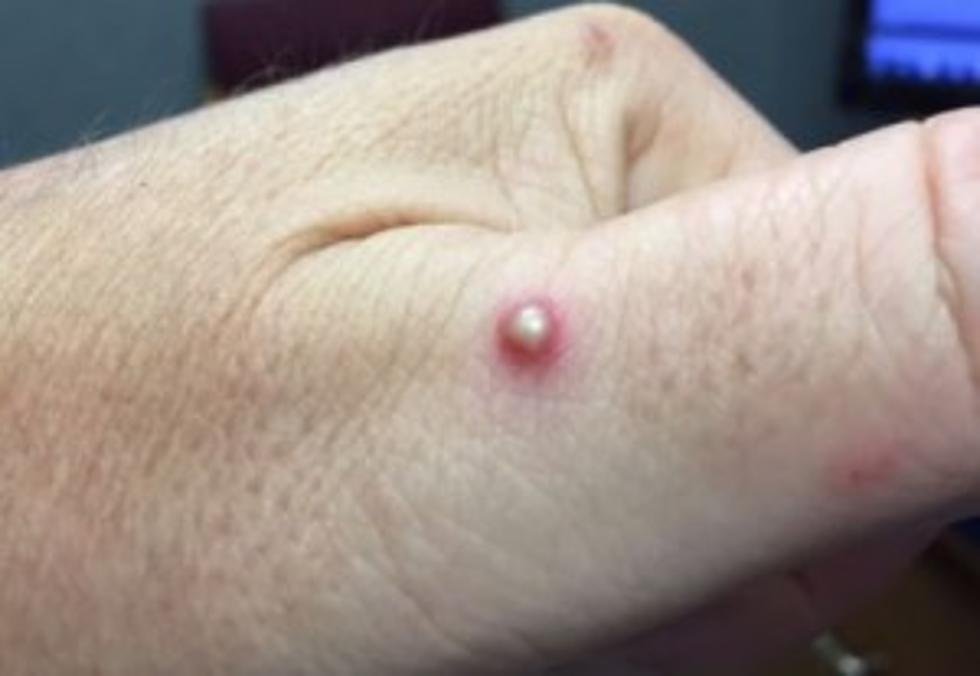It’s not recommended to pop ant bites due to the risk of infection. Popping a blister caused by an ant bite can lead to bacterial entry into the body and potential scarring.
Ant bites can be a nuisance, causing discomfort and sometimes even pain. When faced with a blister caused by an ant bite, the temptation to pop it may arise. However, it’s important to understand that popping an ant bite blister is not advisable.
This is because an open blister can expose the area to bacteria, increasing the risk of infection. In addition, popping the blister could lead to scarring. We will explore the potential dangers of popping ant bites and provide alternative methods for treating them effectively and safely.

Credit: www.reddit.com
Risks Of Popping Ant Bites
If you’ve been bitten by ants, it’s crucial to understand the risks associated with popping ant bites. While it may be tempting to squeeze or pop the bite to relieve discomfort, doing so can lead to potential complications that could worsen the situation.
Potential Infection Risk
When you pop an ant bite, you create an open wound that is susceptible to bacterial infection. Bacteria from your skin or surrounding environment can enter the wound, causing an infection that may require medical attention. It’s essential to avoid popping ant bites to prevent the risk of infection.
Scar Formation Risk
Another risk of popping ant bites is the potential for scar formation. When you disrupt the natural healing process by popping a bite, it increases the likelihood of scarring. Scars can be unsightly and may take a long time to fade. Avoiding popping ant bites can help minimize the risk of developing scars.
Medical Recommendations
It’s not advisable to pop ant bites as it could lead to an infection. Leaving the blister alone allows it to heal naturally and lessens the risk of bacterial infection. Popping the blister may leave a scar and should be avoided to prevent complications.
Prevention Of Infection
When it comes to fire ant bites, it’s important to prioritize the prevention of infection. While it may be tempting to pop an ant bite blister, doing so can increase the risk of a bacterial infection. It’s best to leave the blister alone and allow it to heal on its own. By avoiding the urge to pop the blister, you can reduce the likelihood of introducing bacteria into the affected area.
Avoidance Of Popping Blisters
Popping a fire ant bite blister is not recommended. When a blister is popped, the delicate skin is exposed, providing an opportunity for bacteria to enter the wound. This can lead to an infection, which can cause further complications and delay the healing process. Additionally, popping a blister may also increase the risk of scarring.
If you have been bitten by a fire ant and a blister forms, it’s important to resist the urge to pop it. Instead, keep the area clean and dry, and cover it with a sterile bandage to protect it from further irritation and potential infection. If you notice any signs of infection, such as increased redness, swelling, or pus, it is important to seek medical attention.
To prevent infection and promote healing, it is recommended to:
- Keep the affected area clean and dry
- Avoid scratching or picking at the blister
- Cover the blister with a sterile bandage
- Monitor the area for any signs of infection
By following these recommendations, you can ensure proper care for your ant bite and minimize the risk of complications. Remember, prevention and proper care are key to a swift recovery and a healthy healing process.
Nature Of Ant Bites
When it comes to ant bites, it’s important to understand their nature before deciding whether it is okay to pop them. Ant bites are known for causing discomfort, irritation, and sometimes even pain. These bites can range from minor annoyance to severe reactions, depending on the species of ant and individual sensitivity. It is essential to properly treat ant bites to prevent complications and ensure quick healing.
Sterile Pustules
Ant bites often result in the formation of sterile pustules at the site of the sting. These pustules are small, raised, and filled with fluid. They are a natural response of the body to the venom injected by the ants. The alkaloid part of the venom is responsible for the formation of these pustules. These pustules have cytotoxic and hemolytic properties, which means they are poisonous to cells and can cause damage to red blood cells. Therefore, it is crucial to handle ant bites carefully to avoid further complications.
Alkaloid And Protein Properties
The venom injected by ants consists of alkaloids and proteins. The alkaloid components are responsible for the toxic effects of ant bites. In addition to causing the formation of sterile pustules, these alkaloids can also cause cytotoxic reactions in the body. On the other hand, the protein components of ant venom contain allergens that can trigger allergic reactions in some individuals. These reactions can vary from localized wheal and flare responses to more severe systemic reactions, including anaphylaxis.
- The alkaloid part of the venom causes sterile pustules at the sting site.
- The protein portion contains allergens that can trigger allergic reactions.
- Reactions can range from localized responses to anaphylaxis.
Considering the nature of ant bites, it is generally not recommended to pop the pustules or blisters that form as a result. Popping them can increase the risk of bacterial infection, especially if the blister is scratched or broken. Instead, it is best to let the pustules heal on their own. If necessary, you can apply remedies such as cold compresses or over-the-counter antihistamines to relieve itching and swelling. If the symptoms worsen or you experience severe allergic reactions, it is important to seek medical attention.
Common Reactions To Ant Bites
It’s not recommended to pop ant bites as doing so can increase the risk of infection. Let the bite heal on its own to avoid complications such as bacterial infections or scarring. Resist the urge to squeeze any ant bites and allow them to heal naturally to prevent further issues.
Itching
Ant bites often cause itching due to the venom injected by the ant’s bite.
Swelling
Swelling is a common reaction to ant bites and is typically localized around the bite area.
Burning
The sensation of burning is frequently reported by individuals who have been bitten by ants.
Potentially Serious Issues
While most ant bites result in minor discomfort, there are potential serious issues that can arise.
Best Practices For Ant Bite Treatment
When dealing with ant bites, it’s essential to follow the best practices for effective treatment. Ant bites can cause discomfort and irritation, and understanding how to properly manage them is crucial for a speedy recovery. Below are the recommended methods for treating ant bites to ensure optimal healing and minimize the risk of complications.
Drainage In Painful Cases
In cases where ant bites result in painful, swollen blisters, proper drainage is important for relieving discomfort and promoting healing.
Infection Precautions
Adhering to infection precautions is vital when treating ant bites, as breaking open or popping blisters can increase the risk of bacterial infection, leading to further complications.

Credit: www.reddit.com

Credit: www.reddit.com
Frequently Asked Questions Of Is It Ok To Pop Ant Bites
What Happens If You Squeeze An Ant Bite?
It’s best not to squeeze or pop an ant bite blister as it can lead to bacterial infection and scarring. The blister should heal on its own if left alone.
Should You Drain An Ant Bite?
It’s best not to drain an ant bite blister. Popping it could lead to a bacterial infection and possible scarring. Let the blister heal on its own.
Why Do Ant Bites Turn Into Pimples?
The alkaloid part of ant venom causes pustules at the sting site, leading to pimples.
Does Pus Come Out Of Ant Bites?
Yes, pus can come out of ant bites, but it is best not to pop them to avoid the risk of infection.
Conclusion
If you’ve been tempted to pop ant bites, it’s best to resist the urge. Popping blisters can lead to infections and scarring. Let the area heal naturally to avoid complications. Remember, patience is key when dealing with ant bites to ensure proper healing.

I’m MD Tanvir, and I bring years of expertise gained from working closely with pest control companies to the forefront. My journey in the industry has inspired me to launch Bug Battler, a platform aimed at equipping people with the know-how to combat pests autonomously. Through Bug Battler, I aim to empower individuals with practical insights to tackle pest infestations effectively.

